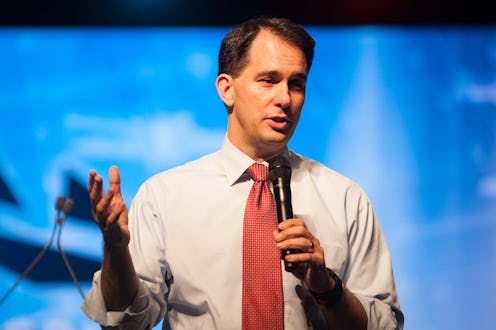On Monday morning, Wisconsin Governor Scott Walker announced that he was running for president, becoming the 15th Republican to officially enter the 2016 presidential race. With much of the young governor's prominence rooted in his strong opposition to labor unions, Walker sure strikes a stark contrast to fellow candidate Bernie Sanders, a senator from Vermont who's known for being a firm proponent of economic justice. In fact, Sanders recently drew a crowd of almost 10,000 supporters during a visit to Walker's own home state.
That's not to say that Sander's trip to Madison went without some opposition. While he was there, Wisconsin Republicans erected billboards that called the self-declared democratic socialist an "extremist." To that, Sanders had a biting response aimed right at Walker himself. During his speech to the crowd, the Vermont politician criticized Walker's conservative track record, saying:
"The billboard indicated that I was an extremist. So let me just say a few words to my friends in the Republican Party about extremism: When you deny the right of workers to come together in collective bargaining, that's extremism. When you tell a woman that she cannot control her own body, that's extremism. When you think a woman is a child and can't purchase a contraceptive, that is extremism. When you give tax breaks to billionaires, and refuse to raise the minimum wage, that's extremism.
Just prior to Sanders' Madison rally, Walker shared his own thoughts about Sanders, saying in a statement:
Bernie Sanders is right about one thing: we don't need another Clinton in the White House. On virtually every other issue, however, he stands in stark opposition to most Americans. Wisconsinites have rejected his top-down, government-knows-best approach three times in the last four years.
It's pretty clear (to everyone) that Walker and Sanders differ on a ton of issues — but here's where they stand when it comes to labor unions, minimum wage, and the Trans-Pacific Partnership Labor Unions in particular.
Labor Unions
It's no secret that Walker isn't exactly an ally to unions. Since becoming Wisconsin's governor, he has consistently fought against them. Back in 2011, he signed an anti-union bill that eliminated most union rights for public employees. Then this year, Walker signed a right-to-work bill that would ban requirements for private-sector employees to pay union fees, and implied that his ability to take on 100,000 pro-union protestors somehow adequately prepared him to take on ISIS. It's probably no surprise then that AFL-CIO president Richard Trumka referred to Walker as a "national disgrace."
Sanders, on the other hand, is generally considered to be a progressive champion. In fact, most of the Vermont politician's biggest donors have been labor unions — and that's throughout his entire career, not just toward his current presidential campaign. Additionally, despite a reminder from Trumka to local AFL-CIO divisions that they weren't allowed to endorse a specific candidate, South Carolina and Vermont AFL-CIO chapters have passed resolutions supporting Sanders.
Minimum Wage
Sanders has repeatedly denounced the federal minimum wage of $7.25, calling it a "starving wage," and believing it should eventually be raised to $15. He's criticized Walker and other conservatives before for favoring the "billionaire class" over working-class Americans, and, as he shared at the Madison rally, he thinks that a refusal to raise the minimum wage is its own form of "extremism."
Walker, on the other hand, has repeatedly argued against raising the minimum wage, saying that he thinks doing so would kill jobs. In an interview with the Milwaukee Journal Sentinel last October, Walker said that he didn't see the point of a minimum wage in the first place, arguing instead that fixing Obamacare would be a better way to help people who are unemployed.
I'm not going to repeal it, but I don't think it serves a purpose because we're debating then about what the lowest levels are at. I want people to make, like I said the other night, two or three times that. The jobs I focus on, the programs we put in place, the training we put in place, is not for people to get minimum wage jobs ... it's to try and provide the training, the skills, the talents, the expertise that people need to create careers that pay many, many times over.
Trans-Pacific Partnership & Fast Track
During a visit to Orlando in June, Walker publicly shared support of the Trade Promotion Authority (TPA). The TPA, as it's come to be known, was a hurdle Congress had to pass before it could hold a final vote on the Trans-Pacific Partnership (TPP) being negotiated between the Obama administration and 11 other countries. At the time, Walker said the deal would be good for American workers, and justified his support of it by saying that it would contribute to free and open trade, of which he describes himself as an advocate.
Unsurprisingly, Sanders remains staunchly opposed to the TPP. In fact, Sanders described the TPP as "anti-worker legislation" in a Huffington Post blog back in May, and argued that the TPP simultaneously allowed corporations to hire cheap labor abroad while hurting middle-class workers in the U.S. He also reiterated his unwavering support for labor unions, explaining that unions were opposed to fast-track legislation because it would lower wages, lead to an increase in pollution, get rid of well-paying jobs, and "undermine democracy."
When all is said and done, it seems that Walker is pretty much everything that Sanders fights against, and vice-versa. Whether or not Walker thinks Sanders poses a real challenge to Clinton, he better watch out — if the stats from Sanders' Madison rally prove anything, it's that a growing number of Wisconsinites are coming out in support of the so-called "Democratic socialist," and not their conservative governor.
